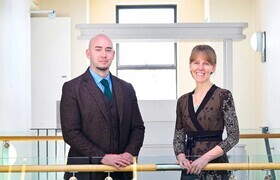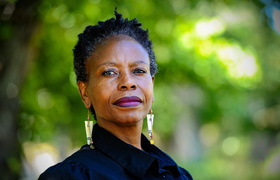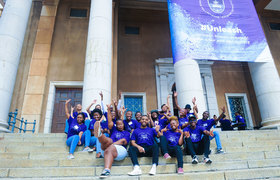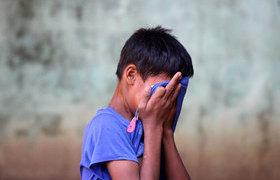Confronting mental health stigma and recovery
30 September 2025 | Story Lyndon Julius. Photos Robin Thuynsma. Read time 7 min.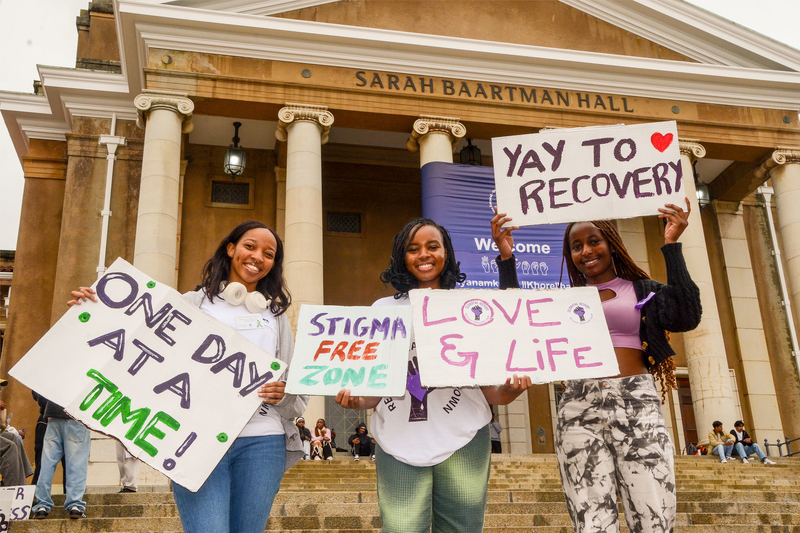
Normalising conversations around addiction and accepting that many face addictions on various levels can offer solidarity to those who live in fear of being stigmatised. This is the perspective of the University of Cape Town (UCT) Deputy Vice-Chancellor for Transformation, Student Affairs and Social Responsiveness Professor Elelwani Ramugondo, ahead of the UCT Recovery Walk, held on 23 September.
The walk was a demonstration of solidarity and a symbol of breaking free from addiction, getting support for mental illness, and recovering from substance abuse.
The event was hosted by UCT’s Department of Student Affairs (DSA), in collaboration with the Student Wellness Service (SWS), and Recovery Walk Cape Town, along with community partners in the field of addiction recovery.
Well-being at the heart of student success
The walk, inspired by the annual Recovery Walk Cape Town, brought together students, staff, and partners to break the silence surrounding addiction, mental health, and recovery. Highlighting the collaboration with Recovery Walk Cape Town, Professor Ramugondo stressed the importance of humility in partnerships.
“Today is a good demonstration of our third mission as a university,” she said. “We have teaching and learning as the first mission; research as the second mission; and we have the societal mission, which this event represents very well.
“UCT is not always holding the answers. There’s a lot we can learn from partners such as Recovery Walk Cape Town. You must see some of the individuals who have recovered from addiction.
“They walk tall today, recovered from those snares. We accept that we are all addicted to something one way or another. By normalising acceptance, we are saying there is no need for stigma. And there is no shame in asking for help – it is courageous.”
Partnerships are key to unlocking collective healing
As part of Mental Health Awareness Month, the Recovery Walk highlighted UCT’s recognition that academic excellence is inseparable from mental health, offering a symbolic gesture of solidarity and a practical call to action.
“The SWS Recovery Walk on UCT campus was inspired by … [Recovery Walk Cape Town], with Debbie Bup and her team, with whom we are collaborating,” said Dr Memory Muturiki, the director of SWS.
“There is a growing need to raise awareness about addiction, substance use challenges, and mental health on our campus. At UCT, we recognise that recovery is a journey that deserves both visibility and support, without stigma.”
The walk was carefully timed to coincide with the Recovery Walk Cape Town in October, aligning campus activities with broader national and global initiatives.
“The walk is designed to open the door to ongoing conversations,” Dr Muturiki continued. “Alongside the event, the UCT SWS is offering information stalls to raise awareness about access to available support, internal and external resources, and peer support opportunities. Students also had the chance to meet the SWS Wellness Buddies and friendly, caring health professionals.”
The practice manager at SWS, Alan Florence, said the event was about more than just planning logistics and ensuring everything was in the right place.
“I believe in the power of community and visibility in recovery and mental health,” Florence explained. “Organising this walk felt like a meaningful way to break the silence, challenge stigma, and create a space where students could feel seen, supported, and empowered in their journeys.”
Florence distilled this sentiment into a single word: “Visibility. Because recovery deserves to be seen. This walk was about making the invisible visible and showing that healing is a journey worth walking together.”
He recalled a planning moment that captured why the walk mattered. “One student told us they’d hardly ever seen recovery recognised publicly on campus before. That moment reminded me why this walk matters. It’s not just an event; it’s a lifeline for some.”
Deepening the understanding of recovery
The walk also drew attention to the role of research and evidence-based practice in addressing addiction and mental health.
“It’s very important as we know that mental health issues contribute to a lot of physical ailments: headaches, stress, and more,” noted Bulelwa Rorwana, a clinical nurse practitioner at SWS. “This initiative helps students identify when they may be struggling and where to seek help.
“So this initiative is very, very important, especially for our students, because we know that most of our students who are coming into student wellness suffer from mental health issues, and sometimes they’re not even aware. So this initiative is very much important, and also for students to know if they are suffering from mental health issues where to go and when to go.”
“There is a growing need to raise awareness about addiction, substance use challenges, and mental health on our campus.”
She added: “The last Wednesday of every month, SWS offers a Wellness Wednesday, where students come in for their mental health screening. In this way, it also serves as another means of identifying mental health issues, and you will be directed to Student Wellness to be seen by one of our clinicians. If you need to be seen by a psychologist, then you’ll be referred to one.”
Solidarity in action through student voices
For students, the Recovery Walk was also about creating a visible culture of compassion. Thandiwe Zwane, the Students’ Representative Council’s (SRC) social responsiveness coordinator, reminded participants that universities are not only spaces of academic pursuit, but of humanity.
“Walking here together is not just symbolic – it’s a show of solidarity and mental health,” she said. “Academic excellence is not the only thing we should strive for. Compassion, awareness, and support are equally important. Let’s walk; let’s care; and let’s continue making society a safe space for everyone.”
A visible future for reflections
The walk was inclusive by design, held along a central, accessible route to ensure participation from all corners of the UCT community. Alongside the event, information stalls, peer support engagements, and conversations with student wellness professionals opened pathways for ongoing dialogue.
Muturiki concluded: “We hope participants leave with the understanding that recovery is possible, that no one should walk their journey alone, and that the UCT community stands together in compassion and solidarity. Seeking help is a sign of strength, not weakness.”
 This work is licensed under a Creative Commons Attribution-NoDerivatives 4.0 International License.
This work is licensed under a Creative Commons Attribution-NoDerivatives 4.0 International License.
Please view the republishing articles page for more information.



















